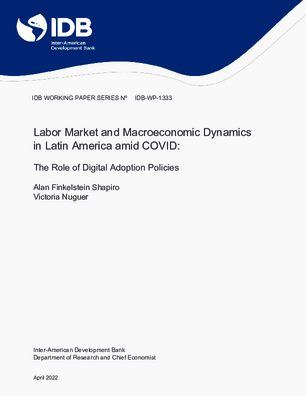Labor Market and Macroeconomic Dynamics in Latin America Amid COVID: The Role of Digital Adoption Policies
Date
Apr 2022
Summary
We study how policies that facilitate firm digital adoption shape the labor market and economic recovery from COVID-19 in a search and matching framework with firm entry and exit where salaried firms can adopt digital technologies and the labor market and firm structure embodies key features of Latin American economies. Using Mexico as a case study, we first show that the model quantitatively replicates the dynamics of the labor market and output at the onset of the COVID recession and in its aftermath, including the sharp decline in labor force participation and informal employment that is unique to the COVID recession. We then show that a policy-induced permanent reduction in the barriers to adopting digital technologies introduced at the trough of the recession bolsters the recovery of GDP, total employment, and labor income, and leads to a larger expansion in the share of formal employment compared to the no-policy scenario. In the long run, the economy exhibits a long-run reduction in total employment and labor force participation, but higher levels of GDP and labor income, greater average firm productivity, a larger formal employment share, and a marginally lower unemployment rate.




